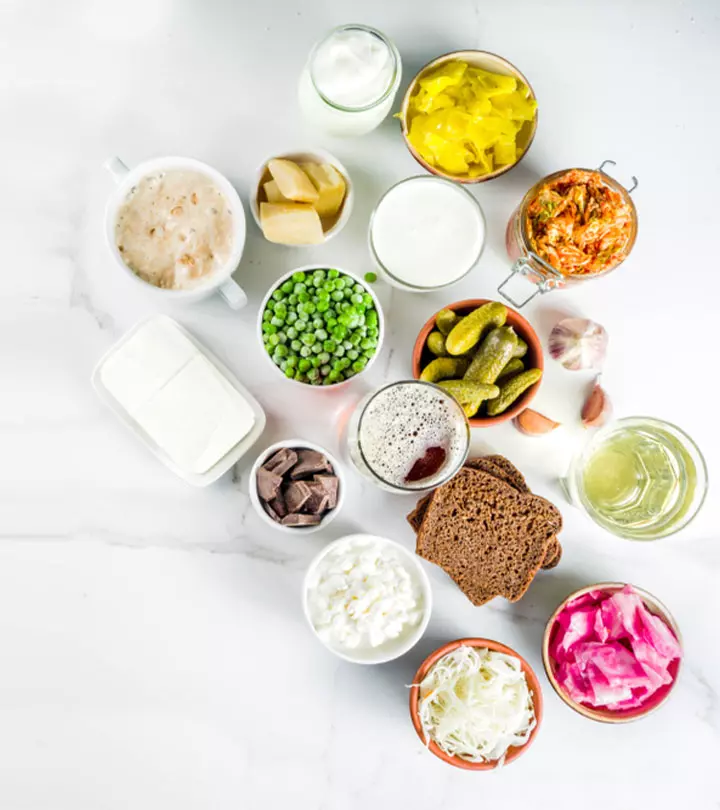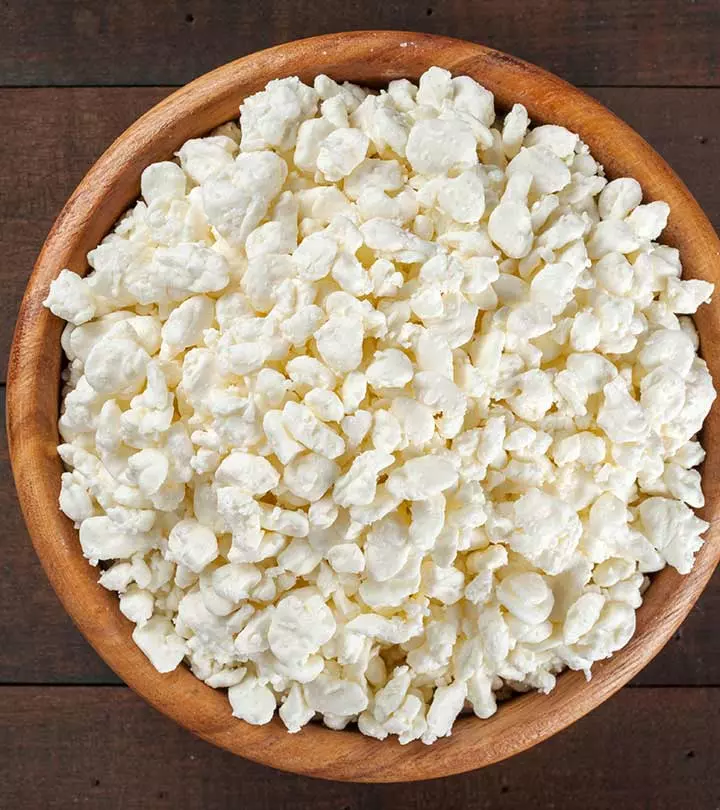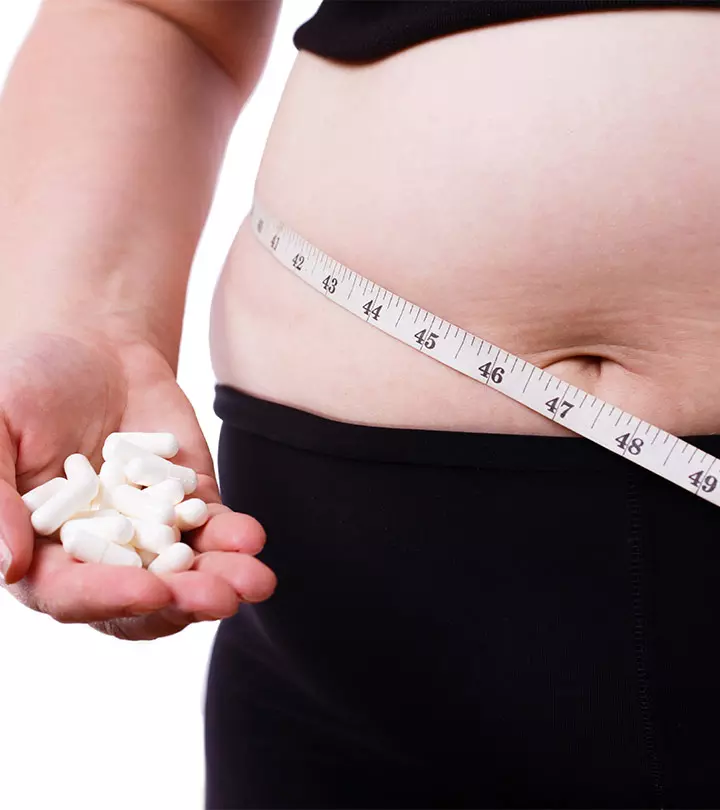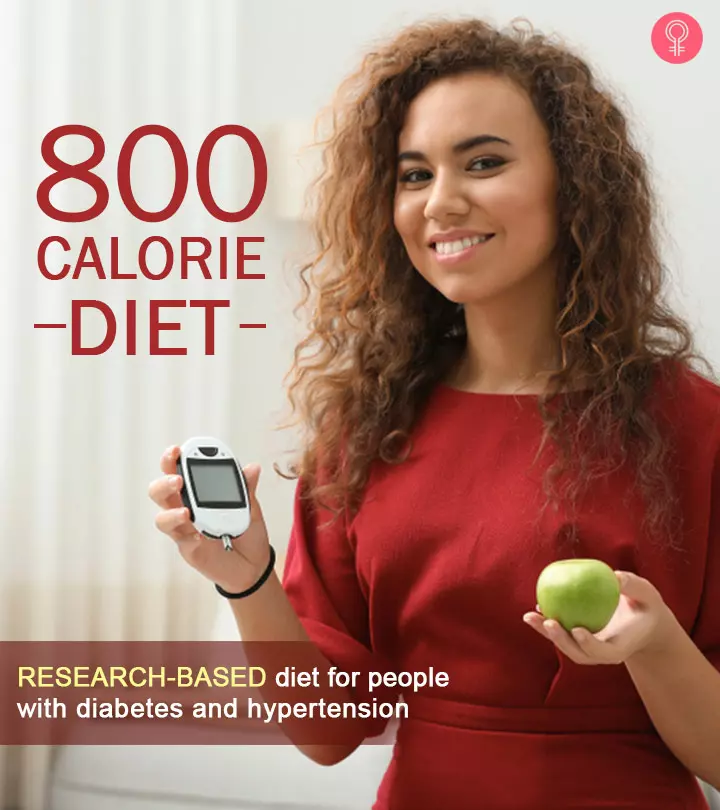Probiotics For Weight Loss: How They Help And Risk Factors
Add these beneficial bacteria to your daily diet to boost your gut health and lose weight.

Image: Shutterstock
It is widely known that probiotics help in weight loss. More and more people are consuming probiotics due to the health benefits they offer. For example, they are great for digestion as they increase the number of good gut bacteria. You can source probiotics from fermented foods or from supplements. The various health benefits of consuming probiotics also contribute to weight loss.
But, how do probiotics work for weight loss? Are there any side effects? Can you consume probiotics without consulting a doctor? We have all the answers you are looking for. Read on!
In This Article
What Are Probiotics?
Probiotics are beneficial microbes present in the gut of the human body. They are taken after an antibiotics course to replenish the bacterial growth in the gut. Fermented foods like yogurt contain these microorganisms. Probiotics are also taken in the form of supplements.
 Did You Know?
Did You Know?Probiotics may not directly contribute to weight loss. However, they enhance factors that promote weight loss. Scroll down to know how they impact weight loss indirectly.
Key Takeaways
- Probiotics are beneficial microbes present in the gut of the human body.
- They may promote weight loss by improving fasting blood glucose levels, among other benefits.
- You can get probiotics from fermented foods like yogurt or take them in the form of supplements.
How Probiotics Help In Weight Loss
1. May Promote Digestive Health
Studies show that probiotics regenerate the digestive system with good microbes that neutralize their harmful counterparts. They ferment food and promote health (1). The beneficial microbes minimize gastrointestinal discomfort and constipation that may otherwise affect digestive health (2).
2. May Help Manage Diabetes
Studies suggest that diabetes and obesity are correlated (3).
A study published in the Annals of Internal Medicine in 2023 analyzed data from the National Health Interview Survey (NHIS) spanning 2016 to 2021. The data encompassed 128,571 non-pregnant adults aged 18 years and older. Findings revealed that 62% of adults with type 1 diabetes were overweight or had obesity, mirroring rates in the general adult population in which 64% faced similar issues.
Thus, weight loss may reduce diabetes risk (4). Taking probiotics may improve insulin sensitivity and fasting blood glucose levels (results post overnight fasting) in patients with type 2 diabetes. Studies suggest that probiotics help in improving glucose levels in people with diabetes. Hence, akkermansia muciniphila, a type of probiotic bacteria, are used in type 2 diabetes treatment. Taking probiotics containing lactobacillus lactis and bifidobacterium acidophilus may also improve lipid profile in patients with type 2 diabetes (5 ). The beneficial microbes may also help improve glycemic control (6).
3. May Reduce The Risk Of Obesity By Burning Fat
Probiotic bacterial strains like lactobacillus fermentum and lactobacillus amylovorus may help reduce obesity risk by burning fat. Recent studies show that lactobacillus fermentum can reduce serum lipid. Similarly, lactobacillus amylovorus may reduce cholesterol levels and hydrolyze bile salts. This may effectively reduce obesity risk and indirectly promote weight loss (7). Besides, another probiotic strain called lactobacillus rhamnosus GGMCC was also found to help with weight loss (though certain other strains did not have a similar effect) (8). However, the same effect may not be observed with all the probiotics as it is strain-specific.
4. May Reduce Inflammation
An increase in body weight may lead to an increase in inflammation (9). Studies show that a combination of different probiotic bacteria such as lactobacillus gasseri, lactobacillus casei DN001, and bifidobacterium lactis may help in reducing inflammation (10). Lactobacilli (members of the lactic acid bacteria) are found to boost anti-inflammatory molecule levels. Probiotics like streptococcus thermophilus and bifidobacterium may also help treat inflammatory bowel disease (11).
5. May Promote Sleep
Studies suggest that sleeplessness increases obesity risk (12). Gut microbes play a role in mental health and sleep. Probiotic microorganisms like lactobacillus reuteri and bifidobacterium adolescentis may help improve sleep quality (13). Improved sleep, in turn, may aid weight loss.
Reduced calorie intake and weight reduction may result from probiotics’ impact on hormone levels linked to hunger and fullness, which may also affect appetite management.
 Fun Fact
Fun FactHowever, more clear research is warranted in this regard.
Probiotics can be taken in the form of supplements or through foods rich in them. Keep scrolling to see the list of probiotic foods that you can consume.
Natural Probiotic Foods
1.Yogurt
Yogurt is a fermented food formed by lactic acid bacteria. The probiotic lactic acid bacteria is proven to have a beneficial effect on diarrhea, bloating, and other gastrointestinal tract disorders (14). Anecdotal evidence suggests that yogurt may also aid with weight loss when made a part of a balanced diet. However, more research is warranted in this regard.
2. Soft Cheese
Gut microbiota play a major role in absorbing all nutrients. Changes in the microbiota may cause various types of gut disorders. These may be managed by consuming probiotics. Soft cheese creates a buffer from the acidic environment in the gastrointestinal tract. It generates suitable conditions for the growth of probiotics (15).
3. Sauerkraut
This is a fermented food made with chopped cabbage. This pickle contains probiotic lactic acid bacteria that improve gut microorganisms (16).
4. Kefir
Kefir is a drink made from fermented milk (any kind). It is known to improve digestion. It may also control plasma glucose levels and act against hypertension and inflammation (17).
5. Kimchi
Kimchi is a traditional Korean side dish made from fermented vegetables, primarily cabbage and radishes, seasoned with gochujang and other spices. The primary probiotics found in kimchi are lactic acid bacteria, including genera like Leuconostoc and Lactobacillus (18). There are many remarkable kimchi benefits; its consumption may decrease the risk of obesity and balance gut microbiota leading to improved digestion, a strengthened immune system, and better skin health (19).
6. Miso
Miso is a Japanese seasoning produced by fermenting soybeans with salt, koji, and other ingredients like rice or barley. It contains various probiotics like Aspergillus oryzae and lactic acid bacteria. Aspergillus is known to have a positive impact on the intestinal bacterial flora, boosting gut health and improving digestion to aid weight loss. Lactic acid bacteria, on the other hand, may boost immune function and improve allergy symptoms (20).
Include all these probiotic foods in your diet in moderation. Avoid them if you are allergic to them. In addition, you should maintain a healthy lifestyle, hydrate your body, and ensure optimum physical activity.
Consuming a variety of foods high in probiotics not only helps maintain gut health but also promotes a varied microbiome, which is important for managing weight and achieving optimal metabolic function.
Another term often used along with probiotics is prebiotics. What are prebiotics? How are they related to probiotics?
Probiotics And Prebiotics – How They May Aid Weight loss
Prebiotics are food components that are not digestible by humans but improve the gut microbiota. They stimulate the growth of gut-friendly bacteria and are a source of enrichment for probiotics. Prebiotics contain fibers that have fewer calories (21).
Mary Wirtz, a registered clinical dietitian, says prebiotic foods are rich in dietary fiber and take longer to digest. This makes individuals feel full throughout the day, helping them lose and maintain healthy body weight.
Risks Of Probiotics
Even though probiotics provide a lot of health benefits, there are some hazards to take into account, especially for people with weakened immune systems or underlying medical disorders.
Probiotic benefits are highly strain-specific. Animal studies state that streptomyces aureofaciens may instead lead to weight gain (22). Probiotics may cause systemic infections, exert a negative effect on metabolic activities, and cause excess immune stimulation in some individuals (23). Hence, take probiotics only upon medical advice.
It is important to remember that the probiotic supplement market is not tightly controlled, which may result in variations in the efficacy and quality of products. When thinking about taking probiotic supplements to lose weight, consumers should exercise caution and look for companies that have undergone clinical validation.
Are Probiotic Supplements Safe For Weight loss?
Probiotic supplements for weight loss are safe but should only be consumed upon medical advice. As stated, weight loss with probiotics is strain-specific. Hence, consuming them on your own may not help. A healthy diet coupled with moderate exercise and probiotic intake may yield results.
Probiotics help in weight loss by promoting digestive health and improving gut bacteria. Fermented foods are a great source of probiotics. Probiotics help manage diabetes, reduce the risk of obesity, reduce inflammation and promote sleep. All these exhibits a positive effect on weight loss. Foods like kefir, soft cheese, and sauerkraut are rich in probiotics. However, there are potential downsides to the probiotics. They may trigger excess immune stimulation, negatively affect metabolic activities, and cause systemic infections. Hence it is advised to take probiotics and supplements with medical advice.
Frequently Asked Questions
Is it OK to take a probiotic every day?
Yes, but in moderation. Probiotics help boost gut health and improve overall health.
What happens when you start taking probiotics?
Probiotics help boost digestion. However, you may experience gas or bloating along with it.
Do probiotics make you hungry?
According to anecdotal evidence, maybe. Some individuals may feel hungry as probiotics modulate gut microbiota and influence gut health.
Learn about the scientific basis for the role of probiotics in shedding pounds and how they can complement your weight loss regimen. Find out the proper way to include these beneficial bacteria in your daily diet.
References
Articles on StyleCraze are backed by verified information from peer-reviewed and academic research papers, reputed organizations, research institutions, and medical associations to ensure accuracy and relevance. Read our editorial policy to learn more.
- Role of Probiotics in health improvement, infection control and disease treatment and management
https://www.ncbi.nlm.nih.gov/labs/pmc/articles/PMC4421088/ - The role of probiotics in digestive health
https://www.dovepress.com/the-role-of-probiotics-in-digestive-health-peer-reviewed-fulltext-article-NDS - Mechanism linking diabetes mellitus and obesity
https://www.ncbi.nlm.nih.gov/labs/pmc/articles/PMC4259868/ - The importance of weight management in type 2 diabetes mellitus
https://www.ncbi.nlm.nih.gov/labs/pmc/articles/PMC4238418/ - Do Probiotics Improve the Health Status of Individuals with Diabetes Mellitus? A Review on Outcomes of Clinical Trials
https://www.hindawi.com/journals/bmri/2019/1531567/ - Efficacy of UB0316, a multi-strain probiotic formulation in patients with type 2 diabetes mellitus: A double-blind, randomized, placebo-controlled study
https://journals.plos.org/plosone/article?id=10.1371/journal.pone.0225168 - Lactobacillus fermentum and Lactobacillus amylovorus as probiotics alter body adiposity and gut microflora in healthy persons
https://www.sciencedirect.com/science/article/pii/S1756464612001399 - Probiotics for the control of obesity – Its effect on weight change
https://www.elsevier.es/en-revista-porto-biomedical-journal-445-articulo-probiotics-for-control-obesity–S2444866416000064 - A prospective study of weight change and systemic inflammation over 9 y
https://academic.oup.com/ajcn/article/87/1/30/4633348 - Probiotics for the control of obesity – Its effect on weight change
https://www.elsevier.es/en-revista-porto-biomedical-journal-445-articulo-probiotics-for-control-obesity–S2444866416000064 - Probiotics in Autoimmune and Inflammatory Disorders
https://www.ncbi.nlm.nih.gov/labs/pmc/articles/PMC6213508/ - Sleep and obesity
https://www.ncbi.nlm.nih.gov/labs/pmc/articles/PMC3632337/ - Effects of Probiotic NVP-1704 on Mental Health and Sleep in Healthy Adults: An 8-Week Randomized, Double-Blind, Placebo-Controlled Trial
https://www.mdpi.com/2072-6643/13/8/2660 - Effect of lactic acid bacteria on diarrheal diseases
https://pubmed.ncbi.nlm.nih.gov/10759139/ - Probiotic cheese: Health benefits, technological and stability aspects
https://www.researchgate.net/publication/223628821_Probiotic_cheese_Health_benefits_technological_and_stability_aspects - Sauerkraut: A Probiotic Superfood
https://www.ffhdj.com/index.php/ffhd/article/view/262/0 - Milk kefir: nutritional, microbiological and health benefits
https://www.cambridge.org/core/journals/nutrition-research-reviews/article/milk-kefir-nutritional-microbiological-and-health-benefits/1393DC2B8E5F08B0BE7BD58F030D387B - Does kimchi deserve the status of a probiotic food?
https://pubmed.ncbi.nlm.nih.gov/36718547/ - Health benefits of kimchi (Korean fermented vegetables) as a probiotic food
https://pubmed.ncbi.nlm.nih.gov/24456350 - Ingestion of miso regulates immunological robustness in mice
https://www.ncbi.nlm.nih.gov/pmc/articles/PMC8782471/ - Prebiotics: Definition, Types, Sources, Mechanisms, and Clinical Applications
https://www.ncbi.nlm.nih.gov/labs/pmc/articles/PMC6463098/ - Weight gain by gut microbiota manipulation in productive animals
https://pubmed.ncbi.nlm.nih.gov/27836763/ - Risk and Safety of Probiotics
https://www.ncbi.nlm.nih.gov/labs/pmc/articles/PMC4490230/
Read full bio of Raelene Soler
Read full bio of Aparna Mallampalli
Read full bio of Ravi Teja Tadimalla
Read full bio of Moksha Gandhi


























Community Experiences
Join the conversation and become a part of our empowering community! Share your stories, experiences, and insights to connect with other beauty, lifestyle, and health enthusiasts.